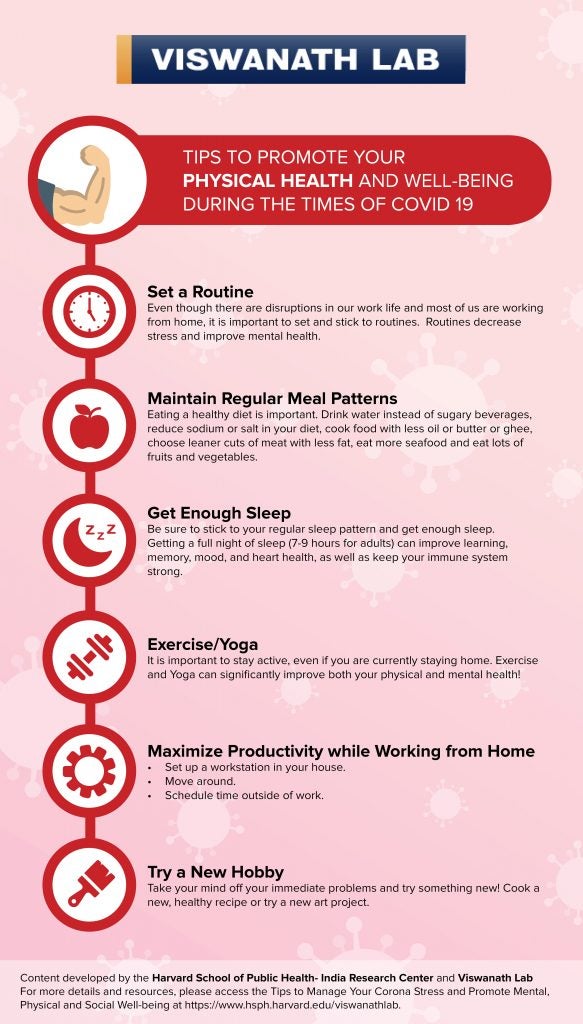- Set a Routine
Even though there are disruptions in our work life and most of us are working from home, it is important to set and stick to routines. Routines decrease stress and improve mental health. Your routine could include time to help your children with learning, work from home, prepare meals, do chores, and healthy activities such as exercise.
- Eat Healthy Foods and Maintain Regular Meal Patterns
Eating a healthy diet is important. Drink water instead of sugary beverages, reduce sodium or salt in your diet, cook food with less oil or butter or ghee, choose leaner cuts of meat with less fat, eat more seafood and eat lots of fruits and vegetables. Staying home may also affect your meal patterns. Research suggests that eating irregular and untimely meals can lead to bad health outcomes. During your time at home, it is advisable to stick to your regular meal patterns.
- Get Enough Sleep
Be sure to stick to your regular sleep pattern and get enough sleep. Schedule a normal bedtime and wake time during the week. This will help you sleep better and wake up feeling more refreshed! Evidence suggests that people who sleep less have more mental and physical health problems. Sleep deprivation can also make existing mental and physical health problems worse. Getting a full night of sleep (7-9 hours for adults) can improve learning, memory, mood, and heart health, as well as keep your immune system strong.
- Exercise/ Yoga
It is important to stay active, even if you are currently staying home. Exercise and Yoga can significantly improve both your physical and mental health! If it is allowed and recommended in your area, you can take walks outside. If you cannot go outside, exercises such as jumping jacks, sit-ups, and push-ups can be done anywhere. Or just walk inside the house or move around instead of sitting. If you want to add weight to your exercises, use water bottles or cans. Yoga can be done in most small spaces as well.
- Maximize Productivity while Working from Home
Many people are now working from home. If you or a family member fall into this category, here are some tips to help you be productive in a new work environment.
5.1 Set up a workstation in your house.
Set up a workstation in your house, whether that is a refurbished guestroom or a specific seat at the dinner table. This can give you a sense of “going to work,” as well as a separation between work and home life. Try to make this place somewhere with natural light, fresh air, a plant, or a view of the outdoors to boost your mood, creativity, and productivity.
5.2 Move around
When working, be sure to stand up every hour, even if it is just for a minute or two! Sitting for too long can slow your metabolism, which has negative health effects. A few minutes of standing, stretching, or walking can help you refocus on your work.
5.3 Schedule time outside of work
Be sure to schedule time with your loved ones, to read that book that’s been sitting on the table for months, and for cooking, cleaning, and exercising. You can even schedule weekly video chats with friends or family members.
- Try a New Hobby
Take your mind off your immediate problems and try something new! Cook a new, healthy recipe. Try a new art project, which has been especially shown to reduce stress, improve creativity, decrease anxiety and depression, promote relaxation, and prevent cognitive decline in the elderly.
Some Useful Resources
- Harvard T.H. Chan School of Public Health: The Nutrition Source
- National Institute of Nutrition: Nutrition Information Communication and Education (NICE) Portal
- World Health Organization: Nutrition
- Centers for Disease Control and Prevention: Healthy Weight
- Piedmont Healthcare: Why Routines are Good for Your Health
- U.S. Department of Health and Human Services: Importance of Good Nutrition
- Harvard Health Publishing: Importance of Sleep : Six reasons not to scrimp on sleep
- Human Spaces: The Global Impact of Biophilic Design in the Workplace


You must be logged in to post a comment.